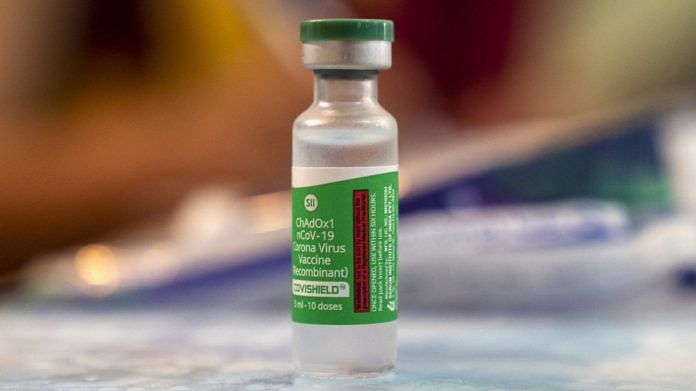New Delhi: As India takes a relook at the Covishield dose gap, results of an ongoing study suggest that the antibody response is better if the gap between the first and second dose of the Oxford–AstraZeneca shot is 44-45 weeks, i.e., over 11 months.
Published in The Lancet, the study also says that the ideal time for the booster dose is at a gap of 28-38 weeks (between 7 to 9 months) after the second dose.
The Covishield vaccine is the ChAdOx1 nCoV-19 (AZD1222) that was developed by AstraZeneca-Oxford University.
“The encouraging results support a strategy of delayed second dosing because antibody titres (concentration) were substantially higher after the second dose among individuals with almost a year between doses than among individuals who had an 8–12 week interval,” researchers from the University of Virginia wrote in a linked comment.
“We report immune responses to ChAdOx1 nCoV-19 following a second dose after an extended interval between the first and second dose, and after a third dose with an extended interval between the second and third dose. The extended interval between the first two doses (44–45 weeks) resulted in higher antibody titres after the second dose than with a shortened interval. A third dose given 28–38 weeks after the primary series increased the antibody titres to above those after a second dose with a shortened interval. Reactogenicity was lower after the second or third dose than after the first dose,” wrote the Jenner Institute, Oxford University researchers.
In May this year, India took the decision to increase the Covishield dose gap citing “real world” data even as many experts had remained sceptical given that till then evidence was only available for a gap period of upto 12 weeks (upto 3 months). India is currently giving the vaccine at a gap of 12-16 weeks (about 4 months). There is no plan to move forward on booster doses yet.
Also read: New human challenge trial in UK to study immune response that can prevent Covid reinfection
Ongoing study
As the trial protocols had been amended during the enrolment period, various participants received the vaccine at varying intervals, beginning from July 2020. These cohorts were analysed to understand the differences in antibody response. The researchers also found that antibody titres achieved by one dose of the vaccine waned over time but remained above baseline levels even after one year.
“We have previously shown that protection against symptomatic COVID-19 is maintained after a single dose of ChAdOx1 nCoV-19 for at least 3 months, despite some waning of antibody levels and we now report that the antibody levels remain above baseline for at least 1 year after single dose immunisation. These data are important for those countries where administration of a second dose is delayed because of a shortage of supply. We also showed here that an extended interval between the first and second dose of ChAdOx1 nCoV-19 results in a significantly higher antibody response 28 days after the second dose than with shorter intervals,” the researchers wrote.
A third dose of the vaccine elicited very good T-cell responses specific to the spike protein of the SARS-CoV-2 virus.
(Edited by Manasa Mohan)
Also read: Modi govt could reduce gap between Covishield doses amid reports of infections among vaccinated



